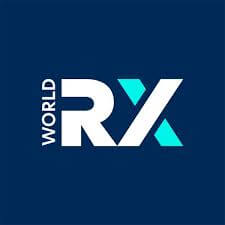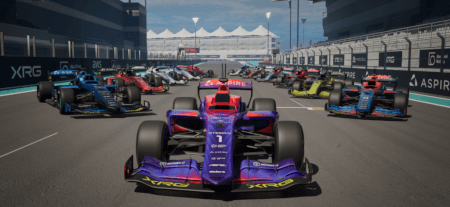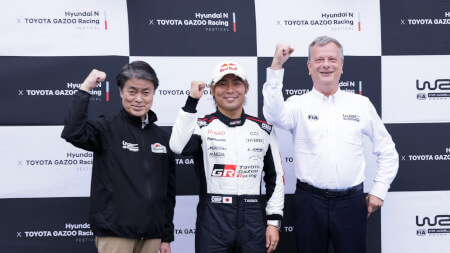September 19th 2025
FIA World Rallycross reverting to European championship for 2026
The FIA has announced that the World Rallycross Championship will revert to a European Championship from 2026, with a standalone "World Cup" event being introduced as well.
World RX debuted in 2014 as a new headline series above the already successful European championship, but has struggled in recent seasons with declining entries and rising costs.
Although it is axing its full world championship, the FIA says it remains committed to growing rallycross in the future, with FIA Road Sport director Emilia Abel saying, “The FIA is committed to delivering the close racing, and spectacle that make rallycross unique, while preparing the sport for an even stronger future, which honors our past, celebrates innovation, and ensures growth in rallycross for years to come.”
“The changes announced today mark an important step in shaping the long-term growth of rallycross,” she said. “From the beginning, our approach has been to listen to the teams, the drivers, the organizers, and above all the fans.
“The FIA has made races free to watch worldwide and built a world-class broadcast experience. But shaping the bigger picture takes time, which is why we are laying out this clear vision for 2026 and beyond.”
Returning rallycross’ premier competition to its European roots is something that has long been called for by fans, and Kenneth Hansen, the 14-time European Rallycross champion and founder of Hansen Motorsport, feels it’s the right way to go moving forwards.
“I think perhaps at this stage it's a good thing to do, because what we see now in Turkey, it's four cars in World RX, and that's not how it should be,” he told RACER. “The FIA, the promoter, needs to do something, and I think they want to go back to a secure route, which would be the European [championship] because then I believe we can have quite a good grid. And it's definitely less cost than to do a world championship.
“And then it seems that they're adding a World Cup race at the end of the year, that makes it like a Super Final, so that can be a good thing to be something between World and Europe.
“It's important that there are as many teams as possible, but I think it's a good move to do this and see if we can come back with a bigger grid, because we need a bigger grid to be successful.”
World RX’s grid numbers have been on the decline in recent years amid an ultimately unsuccessful bid to transition to being a fully electric series.
World RX’s grid numbers have been on the decline in recent years amid an ultimately unsuccessful bid to transition to being a fully electric series.
To try and strengthen grid numbers, with the 2022 and '23 seasons of electric-only competition both attracting only seven full-time entries, World RX has run a unique "Battle of Technologies" format since 2024, with combustion and electric cars competing side-by-side. But that has failed to slow the decline, with only four World RX entrants confirmed for this weekend’s season finale in Turkey following the withdrawal of Hansen Motorsport after it lost a major backer – a move that will mean 2019 champion Timmy Hansen will miss a World RX round for the very first time, having been the only driver to compete at every event up to now.
The 2026 European Championship, however, will do away with EVs entirely, with combustion-engined cars powered by sustainable fuels being the only cars eligible. That decision, while made to bolster overall numbers and provide an opportunity for more privateer entries, poses a problem for the existing World RX field which had adopted the EV tech.
“What is tricky, of course, is that the EV cars haven't been very welcome,” said Hansen. “We haven't been able to grab more manufacturers, as we believed. It's taken away our platform because we don't have any cars, and we’re quite short of time for the next season to do something.
“It could be possible to retrofit the cars, but probably the best would be to perhaps to build new cars, but that's quite a big step also to do that and to find the budget to run the team And of course, we have had the feeling that it could go this direction, so it's not a huge surprise. But still, it's a huge job in front of us.”
A move to electric cars for World RX was first mooted in 2018, and Hansen says that had that not been delayed, manufacturers may have been more willing to commit sooner. The delay led to interested manufacturers backing away and there has since been a change in the automotive landscape – some major carmakers are now revisiting their plans to go fully electric – leading to them continuing to stay away.
“The manufacturers wanted it to be faster, but because of a delay, it seemed to be one part of the reason why they jumped off,” Hansen said. “So that could have been a way to keep the manufacturers.
“But also if we look at it overall with electric, it hasn't gone as much as the manufacturers believed. We can see on the production of battery factories; manufacturers that announced they will go full electric in ‘26 or ‘27 or even 2030 will not produce any more ICE cars but several of them have withdrawn that and said, we will not go full electric. So it seems that it was a true big rush into electric, not only for rallycross or perhaps motorsport, but also overall.
“For sure, it's here to stay, and it will be a big part of the vehicle industry, [but] perhaps the aim was too much, too quickly. For many years worldwide, it will be electric and combustion cars, because it's not possible to go full electric or even hydrogen or other technologies without the ICE.”
Another complication is the incoming new regulations for 2028, which could lead to a huge financial outlay for only two seasons before teams currently running EVs like Hansen are forced to rethink once again. A short-term solution could be to buy existing cars, something which Hansen as a long-time constructor hasn’t done before.
“If we get more news about the 2028 regulations then, of course, it is possible that we could do that, or rent cars or something, because we want to be there,” said Hansen. “We love the sport, and it's our key point. But still, if it's too complicated, then we will not be able to be there next year, and perhaps we need to focus on the new regulations, because there is a gap for two years. But I also hope there will be an overlap with the new regulations and we don't need to start all over again if it's tricky to get the new cars for ‘28.”
Aside from grid numbers, World RX has also struggled with a lack of longstanding events outside its home continent.
While the series was given dispensation to retain its "World" moniker despite not hosting events across three continents (as is necessary for FIA world championship status) during the COVID-hit 2020 and '21 seasons, it is something that's persisted, with the 2023 campaign – which included races in South Africa and Hong Kong – being the only one to go truly global since then.
Last season again featured races only in Europe, while this year's six-round calendar will conclude in Istanbul this weekend with a doubleheader following events in Portugal, Sweden, Hungary, and Finland.
Although rallycross is very much a European discipline – devised in the UK and very popular in the likes of France and Nordic region – its stature there has taken time to build, time other markets haven’t had.
While Canada successfully ran a World RX event from 2014-2019 and South Africa held three races from 2017-19 and had a one-year return in 2023, Argentina lasted for only three years – between 2014-16 – and Abu Dhabi, the U.S. and Hong Kong all only hosted one round apiece, while long-talked-about plans for a race in Australia have yet to come to fruition.
“If you look back on, for example, Holjes (in Sweden), it took them many years to come up and be successful enough. You don't just click and it's a huge success," Hansen noted. "It's something you normally need to build up – you need to learn the people and the sport, and if you come to a new country, it's quite unknown.
“[One way] to grab people, to have more interest, would perhaps be to have star drivers from that country, from F1 or rally, national championships, touring car, or something that perhaps could help to get the interest. But I still think it takes some years to peak. People have been to the event, and if it's a really good event, they speak with other people, and then next year, it's more people there and more media to look at it. So it's, it's a ladder to climb, and that, I think we have tried many times, one or two years in certain places, that's too short, too little.”
For more information: www.racer.com
For more Industry News, please Click Here
For more information: www.racer.com
For more Industry News, please Click Here












